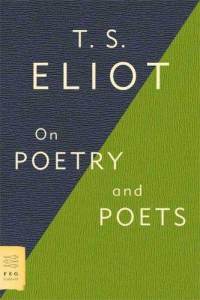 This is my second time through T.S. Eliot’s On Poetry And Poets, separated from my first reading by several years, and I’ve found my early antipathy to Eliot’s criticism – beginning with his pronouncement that Hamlet is an “artistic failure” – largely dissipated. As a poet, Eliot’s reputation is fixed: he is without question the single most important poet of the 20th century, and stands in rare company as one of the century’s best. Appraising Eliot the critic is a harder task. The New Criticism he helped shape and popularize is out of vogue, though vestiges of its methods and judgments linger, and the current – and in my humble opinion, deplorable – state of literary studies is very much a reaction against New Criticism, a kind of hyper-subjective rejoinder to the sterility, or perceived sterility, of New Criticism.
This is my second time through T.S. Eliot’s On Poetry And Poets, separated from my first reading by several years, and I’ve found my early antipathy to Eliot’s criticism – beginning with his pronouncement that Hamlet is an “artistic failure” – largely dissipated. As a poet, Eliot’s reputation is fixed: he is without question the single most important poet of the 20th century, and stands in rare company as one of the century’s best. Appraising Eliot the critic is a harder task. The New Criticism he helped shape and popularize is out of vogue, though vestiges of its methods and judgments linger, and the current – and in my humble opinion, deplorable – state of literary studies is very much a reaction against New Criticism, a kind of hyper-subjective rejoinder to the sterility, or perceived sterility, of New Criticism.
Eliot is a poet-critic – as were Johnson, Dryden and Coleridge, his holy triumvirate – and this, as he readily acknowledges, has both its advantages and disadvantages. As a poet, he has a familiarity with the craft that gives him keen insight, but his experience prejudices him towards the kind of poetry he wishes to write. This Eliot freely admits, and this admission has gone a long way towards making his criticism more palatable to me.
One of Eliot’s most enduring commandments is that poetry should be written in a language approximating the vernacular – that is, in an idiom recognized as current – and this, it seems to me, is as fruitful a topic for discussion as any. It is on these grounds that he criticizes Milton as having had an enduringly bad influence on poetry, for he, in Eliot’s phrasing, “writes English like a dead language.” And in so far as he restricts himself to discussing Milton’s influence, Eliot is surely right. Milton is too much his own, stylistically, to exercise a benign influence on his descendants; any budding poet seeking to emulate him quickly realizes what Keats knew instinctively: “Life to him would be death to me.” But the extent to which Milton’s negative influence can be said to reflect poorly on Milton as a poet is where Eliot and I part ways, and I think the source of the dispute lies in this question of poetic language. If poetry’s principle function is the conveyance of a thought, idea or emotion, it follows that the language best suited for that purpose is the one that most closely approximates the common language at any given time. And yet we recognize a higher purpose to poetry when we make the claim, as surely we must, that there’s a substantive difference between “I love you” and “Let me not to the marriage of true minds admit impediments…”
Poetry, it seems to me, has less to do with direct communication than with the conveyance of feeling, and once you make that concession, the question of how best to convey a feeling no longer admits of an easy answer. I am deeply enamored of both Eliot and Milton – “Prufrock” and sections of Paradise Lost have meant a great deal to me – but there is something elevating to the experience of reading Milton that Eliot rarely, if ever, matches. I don’t offer this as a judgment against Eliot – it strikes me more as a difference in function than quality – but it nonetheless bears mentioning. Milton has been variously called “powerful” and a poet of the capital-S Sublime, and I think that speaks to this difference as well, and goes a long way towards explaining the scriptural authority with which Milton’s verse has been revered. Milton does not condescend to us. Rather than stoop to our understanding, he waits stubbornly in the heights, demanding that we adapt ourselves to him. In saying this of Milton, I am paraphrasing James Joyce’s biographer Richard Ellmann, in a famous statement he made about Joyce, but I think the comparison is apt, the more so because it is one Eliot himself makes. In 2014, in an era of Tweets and text messages and semi-literate presidents, it doesn’t seem to me such a terrible idea for a poet to lead rather than follow in matters of language.
In re-reading Eliot’s criticism, I am above all struck by his humility, which is a strange thing to say about someone who doesn’t hesitate to pronounce judgment on the most revered canonical poets. Eliot does not impose his opinions or appeal to his authority; there are no decrees. He even seems genuinely surprised by the influence his criticism has had, and by the popularity of such concepts as the “objective correlative.” On Poetry And Poets is an enjoyable and enlightening read, and Eliot an acute critic.